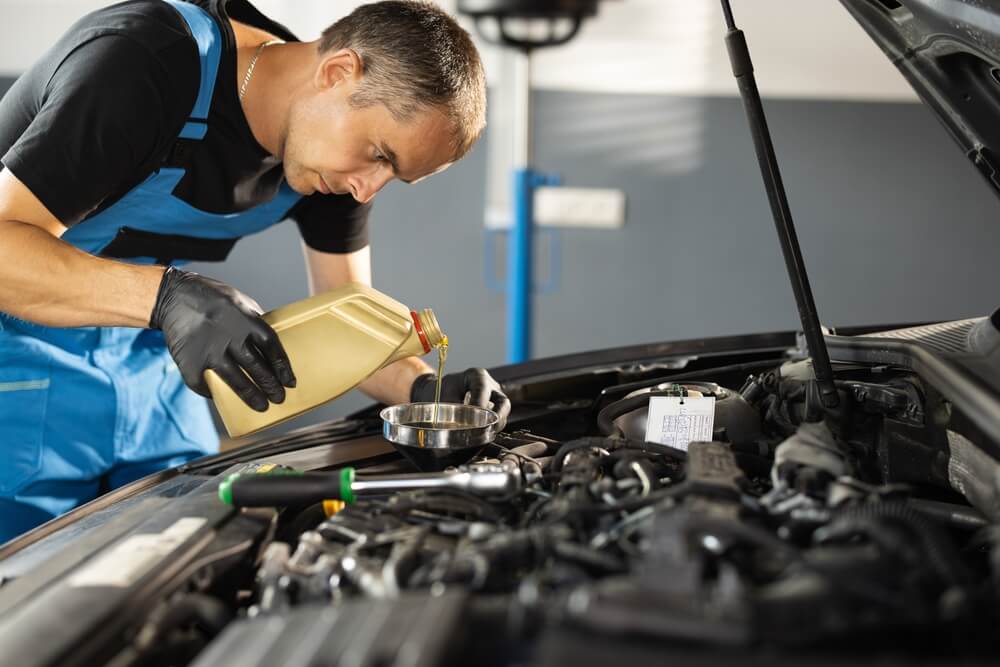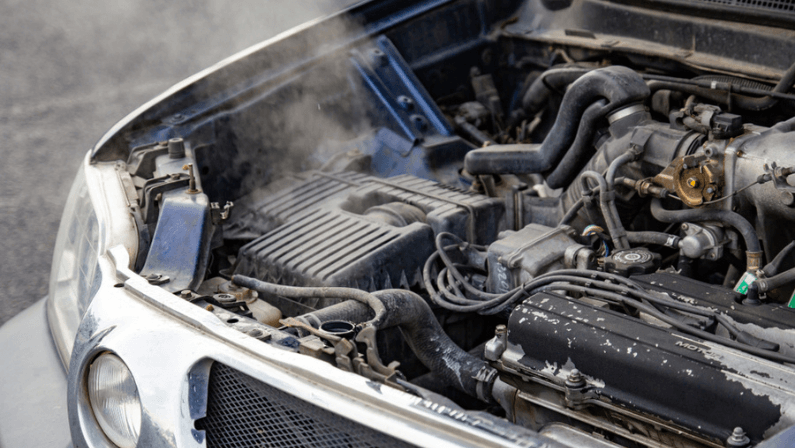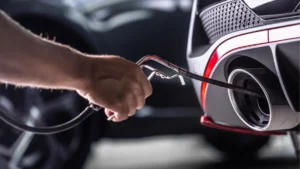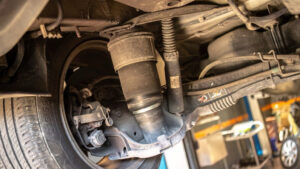Regular oil changes are essential for maintaining the health and longevity of your vehicle’s engine. However, many drivers may overlook or delay this vital maintenance task.
Find out the potential consequences of overlooking oil changes and explore this vital step’s impact on engine performance, longevity, and overall vehicle reliability.
What Does Engine Oil Do?

Engine oil plays a serious role in lubricating the moving parts within your vehicle’s engine, reducing friction and heat generation. If you are wondering what does an oil change do to your car, it also helps clean the engine by carrying away dirt, debris, and combustion byproducts, preventing harmful deposits from building up. Furthermore, engine oil acts as a sealant, forming a protective barrier between metal surfaces to prevent corrosion and rust.
How Often Should You Change Your Oil?
The frequency of oil changes depends on various factors, including the make and model of your vehicle, driving conditions, and manufacturer recommendations.
As a general guideline, most experts recommend changing your oil every 5,000 to 7,500 miles for conventional oil and every 7,500 to 10,000 miles for synthetic oil. However, it’s essential to consult your owner’s manual or a trusted mechanic to determine the ideal oil change interval for your specific vehicle.
Additionally, frequent stop-and-go driving, towing heavy loads, or driving in extreme temperatures may warrant more frequent oil changes to make sure there is optimal engine performance and longevity.
What Happens If You Don’t Change Your Oil?

With no oil change, there can be a cascade of detrimental effects, leading to potentially costly repairs and decreased performance.
Corrosion
Without regular oil changes, moisture and contaminants can accumulate in the engine, leading to corrosion of metal components. Over time, corrosion can weaken crucial engine parts, such as bearings and cylinders, compromising their functionality and potentially causing leaks or failures.
Accelerated Engine Wear
Getting an oil change can affect the engine. Oil serves as a lubricant, reducing friction between moving parts in the engine. When oil becomes old and contaminated, its lubricating properties diminish, leading to increased friction and accelerated wear on vital engine components like pistons, crankshafts, and camshafts. This can result in diminished engine performance, decreased fuel efficiency, and the need for costly repairs or engine replacement.
Sludge Accumulation
Over time, old oil can break down and form sludge, a thick, sticky residue accumulating within the engine. Sludge can clog oil passages, restrict oil flow to critical components, and impede proper engine lubrication. As a result, engine parts may experience increased friction and heat, leading to premature wear and potential damage.
Overheating
Proper engine lubrication helps dissipate heat generated by friction and combustion. When oil becomes degraded or insufficient, it loses its ability to effectively cool and lubricate the engine, leading to increased friction and heat buildup. Persistent overheating can cause engine components to warp, seize, or suffer irreparable damage, compromising engine performance and reliability.
Total Engine Failure
Ultimately, the cumulative effects of neglected oil changes can culminate in total engine failure. Without adequate lubrication and cooling, engine components can wear out, seize, or sustain irreparable damage, rendering the engine inoperable. Engine replacement or extensive repairs may be necessary, resulting in significant expenses and inconvenience for vehicle owners.
How Do You Know When Your Car Needs an Oil Change?

Fortunately, your vehicle provides several warning signs that indicate it’s time for an oil change. By paying attention to these indicators, you can have timely maintenance and avoid potential engine damage or breakdowns. In this article, we’ll explore nine common signs that signal your car is due for an oil change, empowering you to take proactive measures to keep your vehicle running smoothly.
Unusual Sounds From Your Engine
Listen for any unusual sounds from your engine, such as knocking, ticking, or grinding noises. These sounds may indicate that your engine components are not properly lubricated due to old or degraded oil, leading to increased friction and potential damage.
Dirty or Grimy Oil
Inspect your engine oil using the dipstick or by visually examining the oil color and consistency. If the oil appears dark, gritty, or sludgy, it’s a clear indication that it’s time for an oil change. Dirty oil loses its lubricating properties and can no longer effectively protect your engine from wear and tear.
Your Oil Level Is Low
Check your vehicle’s oil level regularly using the dipstick. If you notice that the oil level is consistently low, it could mean that your engine is burning oil or experiencing leaks. In either case, it’s essential to replenish the oil promptly for proper engine lubrication and prevent damage.
Dashboard Warning Lights
Pay attention to any dashboard warning lights related to your engine or oil system, such as the oil pressure light or check engine light. These indicators may illuminate when your car’s oil level is low or when there are issues with oil pressure, signaling the need for immediate attention and an oil change.
Smoke From Your Exhaust
Excessive smoke coming from your exhaust pipe, especially if it appears thick, dark, or blue in color, can indicate oil burning within the engine. This could be due to old or contaminated oil, worn piston rings, or other engine problems, highlighting the need for an oil change and potential engine inspection.
Abnormal Vibrations
Notice any unusual vibrations or rough idling while your vehicle is running. These vibrations may indicate inadequate lubrication within the engine, resulting from old or degraded oil. Addressing this issue promptly with an oil change can help restore smooth engine operation and prevent further damage.
A Burning Smell
If you detect a burning odor inside or around your vehicle, it could be a sign of overheating engine components or oil leaking onto hot surfaces. This burning smell may indicate that your engine oil is old, contaminated, or insufficient, necessitating an oil change to prevent potential engine damage or fires.
You Travel Often
Frequent driving, especially over long distances or in challenging conditions, can accelerate oil degradation and increase the need for more frequent oil changes. If you’re a frequent traveler or use your vehicle for long commutes or towing, consider adjusting your oil change intervals to have optimal engine performance and longevity.
Your Gears Don’t Shift
If you are driving without changing oil, you may experience difficulty in shifting gears or erratic transmission behavior. This can sometimes be attributed to low or degraded transmission fluid, similar to engine oil. If you experience problems with gear shifting or notice slipping, jerking, or hesitation, it’s essential to check both your engine oil and transmission fluid levels and address any issues promptly, including an oil change if necessary.
How Long Can You Go Without an Oil Change?
When it comes to the longevity of your vehicle’s engine without an oil change, it largely depends on various factors such as the type of oil used, driving conditions, and the age of your vehicle.
How long can your car go without oil depends on different factors. While modern engines and synthetic oils can extend oil change intervals, it’s generally recommended to adhere to manufacturer guidelines, which typically suggest changing your oil every 5,000 to 7,500 miles for conventional oil and every 7,500 to 10,000 miles for synthetic oil.
What To Know Before Getting An Oil Change
Before getting oil changed, there are several key considerations to keep in mind for a smooth and efficient process.
Firstly, familiarize yourself with your vehicle’s maintenance schedule and the type of oil recommended by the manufacturer. Additionally, be prepared to communicate any specific concerns or preferences on how to get your oil changed to the service technician, such as driving habits, performance issues, or previous maintenance history.
Where To Get Your Oil Changed
When it’s time for an oil change, you have several options for where to go. One common choice is an automotive service center or dealership, where trained technicians can perform the oil change quickly and efficiently.
If you’re in Houston, consider getting your oil changed at Status Automotive and Collision. Our experienced technicians are trained to perform thorough oil changes using premium-quality oil and filters to keep your engine running smoothly.
In addition to oil changes, we offer various automotive services, including diagnostics, repairs, and maintenance, ensuring that your vehicle receives comprehensive care under one roof. Schedule an appointment with us today so you can know how long do oil changes take and experience the difference in our quality craftsmanship and attention to detail.
Benefits of Changing Your Oil on Time
Are oil changes important? Absolutely. By adhering to recommended oil change intervals, you can reap a multitude of benefits that extend beyond just engine health.
Healthy Engine and Vehicle Longevity
Changing your oil on time helps keep your engine clean and properly lubricated, reducing friction and wear on vital components. This promotes a healthier engine and prolongs the overall lifespan of your vehicle. Additionally, regular oil changes prevent the buildup of harmful deposits and sludge, which can impede engine performance and lead to costly repairs or premature engine failure.
Protect Other Components
In addition to lubricating the engine, oil also helps protect other components such as the pistons, camshafts, and crankshafts from excessive wear and tear. Maintaining clean and adequately lubricated parts can prevent damage to these critical components and have a smooth operation of your vehicle’s entire system. This proactive approach to maintenance can save you time and money in the long run by minimizing the risk of costly repairs and replacements.
Better Gas Mileage
Fresh, clean oil reduces friction and improves engine efficiency, improving fuel economy and gas mileage. When your engine operates smoothly and efficiently, it requires less fuel to perform its tasks, resulting in savings at the pump. By staying on top of your oil change schedule, you can maximize your vehicle’s fuel efficiency and minimize environmental impact.
Pass Emissions Tests
Regular oil changes help reduce harmful emissions by maintaining optimal engine performance and combustion efficiency. Clean oil makes sure that your engine operates at peak performance levels, minimizing the production of pollutants such as carbon monoxide and hydrocarbons. This can help your vehicle pass emissions tests with flying colors, ensuring compliance with environmental regulations and avoiding potential fines or penalties.
Importance of Timely Oil Changes for Vehicle Health and Longevity
Indeed, your vehicle’s health and longevity are important, and regular oil changes play a crucial role in achieving this.
By adhering to recommended oil change intervals and seeking the expertise of a trusted mechanic in Houston, such as Status Automotive & Collision, you can safeguard your engine’s performance and protect against costly repairs.
Don’t overlook the significance of routine maintenance—keep your vehicle running smoothly and efficiently with timely oil changes and auto repair in Houston. Trust Status Automotive & Collision for all your auto repair needs in Houston.




